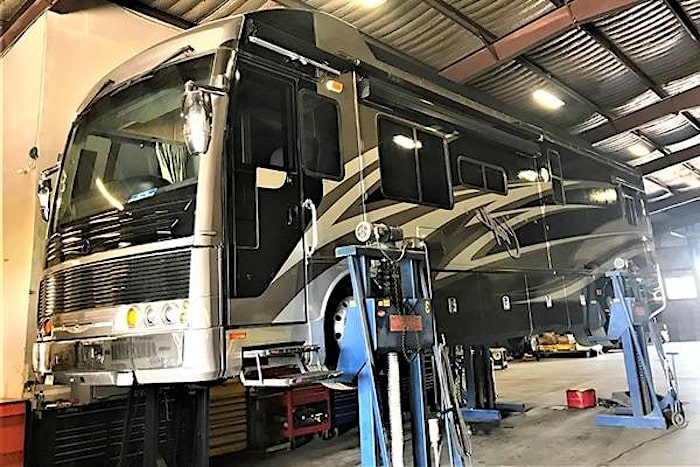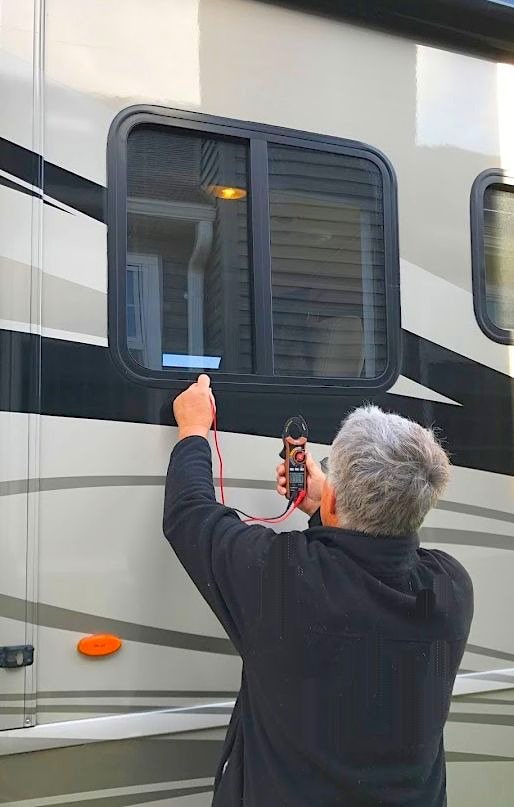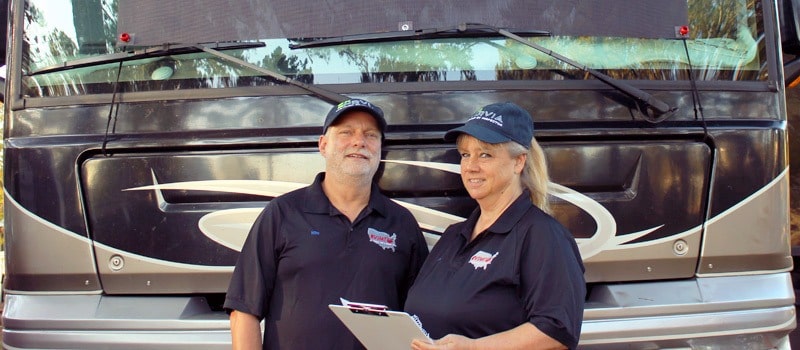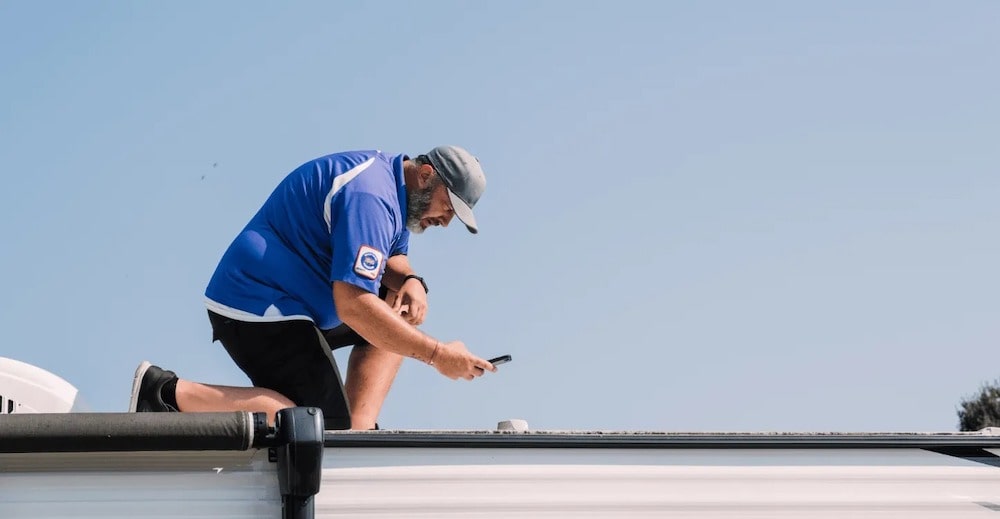Thanks for your support! If you make a purchase using our links in this article, we may make a commission. And, as an Amazon Associate, I earn from qualifying purchases. See the full disclosure here.
Updated Feb 9, 2024
If you’re in the market for a motorhome or travel trailer, have you considered an RV inspection but you aren’t sure if it’s worth the cost? You’ll want to consider the continuing costs the coach will need to keep it in prime condition.
The two happiest days in an RV owner’s life: the day you buy the RV, and the day you sell the RV.” -Anonymous
Emotional buyers will find an RV that fits well into their budget but underestimate the invested time and money needed to make needed repairs. It’s easy to fall into the emotional buying trap since the RV lifestyle is a dream fulfilling goal. If you buy one that’s beyond your capabilities, this dream-come-true could become a big regret.
We’ll answer the burning question, is an RV inspection worth the cost and show you the many different aspects of them. You’ll also learn about the benefits of hiring a certified inspector or performing your own inspection.
We even include an awesome RV Inspection Checklist at the end of the article should you decide to conduct your own RV inspection.
Why Get an RV Inspection?
If you’re an RV vintage enthusiast purchasing a 1963 Dodge Travco (the first mass-produced class A motorhome) looking to bring it back to its former glory, performing an RV inspection is pretty apparent. Buyers like this usually have the skills and resources to conduct their own pre-purchase RV inspection.
What about a family of four who found a 25 foot Fleetwood Prowler travel trailer for less than $10,000? Both parents don’t have backgrounds in carpentry, electrician, or any other field that would help them perform a thorough inspection. The RV may look incredible for its age on the surface, but they may not know if getting this RV is worth it.
Most RV purchasers are like the family of four versus the vintage enthusiast. A significant portion of first-time RVers don’t have the experienced eye like veterans. The last thing the family of four wants to do is to dip into essential savings to repair the frame, plumbing, or electrical components after the purchase.
Private Sellers
Private sellers perform over 60% of all RV sales. There are many reasons why people sell their RVs. Lifestyle changes, financial issues, and upgrading/downgrading are some of the more common causes.
You can find used RVs for sale by owners on Craigslist, RVT, and RV Trader. Most of the sellers will identify known problem areas during the walkthrough and on listings. While the RV sits idle, new issues could develop, or there could be existing issues unknown to the seller.
Once the paperwork is signed, any problems with the RV are now yours. Having a pre-purchase inspection will identify all of the issues with the RV. When you have a complete picture of the facts, you’ll be able to make a better decision to determine if you have the resources and capabilities to resolve them.
RV Dealers
RV dealerships are good at what they do. When they receive a used RV from a trade-in or the auction, they perform their inspections. Their inspections meet state and federal safety standards. They also go through the coach components and repair major problems. Their goal isn’t objectively altruistic.
Making the unit “camp-ready” for resale allows them to sell the RV. Little things like decor pieces or components that work for now may not get the attention it truly deserves. They won’t hide anything from you, but at the same time, your sales representative won’t be the first to raise their hand and tell you about it.
Having an independent RV inspection performed by a certified inspector or coming prepared with your pre-purchase checklist (see our list below), will give you the best chance to find those things not adequately addressed. Make sure you carefully read through all of the paperwork to examine what they saw on their inspection.

What are the Different Types of RV Inspections?
There are different types of RV inspections with unique purposes. Specific reviews are required by authoritative bodies, while others will focus on the status of various components. Travel trailers and 5th wheels have to be inspected like motorhomes, but they have different standards.
Mandatory State RV Inspection (DOT Minimum)
In the registration process, every state requires a mandatory state inspection. This inspection usually entails a safety check of automotive components and meeting emission standards for motorhomes. States that have weight restrictions will also want a certified unloaded vehicle weight (dry weight) measurement performed.
They’ll also require that all Department of Transportation (DOT) lights and reflectors are fully functional. People often fail due to a cracked reflector or a missing clearance light.
Costs can range from as little as $40 to $1,000, depending on your RV. Not every DMV performs these inspections. To locate an RV inspection DMV, contact your local DMV, or search for “RV inspection stations near me.”
RV Pre-Purchase Inspection
Pre-purchase inspections take the most time to conduct. The review can take hours or days, depending on the level performed. Professional inspectors will look at the automotive, exterior, and interior of the coach. Every component and system gets a full checkup to determine its functionality and current status.
Complete pre-purchase inspections are very detailed. Performing this type of investigation isn’t a quick visual look. Professional inspectors use tools to measure things, check seals, scrutinize hardware tightness, and other minute details. These types of inspections can range in cost from $100 to as much as $1000.
When they look at an exterior rear quarter panel, they don’t look at it and say it has a few scratches. They get down on the ground and examine it. They’ll tell you which ones are likely to become open cracks, if the panel is repairable, or if it needs total replacement with specific reasons.
Inspectors subject every component of the RV to this level of detail. In the grand scheme of things, a quarter panel can be lower on a repair priority list if there is an identified plumbing repair. With this level of detail, an inspection of this quality should be the benchmark of any pre-purchase inspection, even if you conduct it yourself.
There are higher levels of pre-purchase inspections that get into forensics levels. They’re more costly but worth every penny for more expensive RVs. Professional inspectors can send fluids to labs to test for various contaminants. Luxury level class A RV buyers will find these results worth the expense (usually over $1,000).
This second level of inspection tests other components in more detail as well. Insulation samples, ducting samples, and other forensic-type tests get analyzed. Travel trailers and RVs that don’t have a sizeable six-figure price tag won’t necessarily need this type of analysis. RV inspection costs at their level can range from $300-$600 on average.
What is a Level 1 RV Inspection?
A level 1 RV Inspection is a basic inspection that makes sure your RV is safe to drive. It commonly includes a visual inspection of the RV and also includes turning everything on and off to make sure it works. Sometimes the inspector will walk the RV owner through to show them how everything operates.
What is a Level 2 RV Inspector?
A level 2 RV inspection dives much deeper into testing the functionality of all of the components of the RV. Level 2 Inspectors must pass an exam after completing a 5 day hands on course to be certified by the NRVIA. They can pull fluid samples and perform more in depth testing to determine the road worthiness of an RV.

Red Flags On RV Inspections
There are several red flags RV buyers should know during the inspection process.
- Exterior Signs: Look for delamination, rippling, bubbling, or evidence of collision damage on the walls.
- Water Damage: Check for signs of water damage, such as stains, mold, or soft spots on the floor and ceiling. Also, inspect for broken pipes, roofing issues, and potential leaks.
- Mechanical and Electrical Issues: Test all systems, including the electrical, plumbing, and HVAC. Look for non-functional appliances, slide problems, and electrical issues.
- Sealant and Tape Jobs: Excessive sealant and major tape jobs can indicate underlying issues and poor maintenance.
- General Maintenance: Pay attention to the overall maintenance of the RV, including the condition of the roof, interior components, and signs of rodent infestation.
Consider hiring a certified inspector to assess the RV thoroughly for potential red flags before purchasing.
And remember, contrary to common myths, even new RVs may have issues and should undergo an independent pre-purchase inspection.
How Much Does an RV Inspection Cost?
RV Inspections to pass your state safety requirements can cost from as little as $40 to $1,000, depending on your RV. Not every DMV performs these inspections. To locate an RV inspection DMV, contact your local DMV, or search for “RV inspection stations near me.”
An RV Pre Purchase Inspection can cost anywhere from $100 to $1,000 depending on the size of your rig and how much detail you want from your inspection.
Do I Need an RV Inspection to Get an RV Loan?
Financing for RVs is possible. Think of it as a combination of an auto loan and a home loan. RVs depreciate like a car but have term lengths like second homes (up to 15-20 years depending on the RV and price). Interest rates range from 4% to the late-teens.
The average RV depreciates 20% in its first year. Each year it continues to decrease in value like any vehicle. RV lenders ask for several things when they review an application for a loan. If you’re buying a used RV (especially from a private seller), you will need an RV inspection to get an RV loan. Lenders will also ask for the following:
- Typical loan information (personal information, credit score, income, etc.)
- Between 10-20% as a down payment or collateral
- The inspection to determine the RV’s objective value
- The coach’s age and mileage
- The final negotiated price you’re applying for
How Do I Find Certified RV Inspectors?
There are a couple of avenues you can take to find a good inspector. Some have used friends that have “done it, seen it, and been through it” when it comes to RVs. These veteran RVers may have real-world experience and know what to look for, but unless you have a formal contract written up, all liability is on you. This scenario is one of the best ways to ruin a friendship.
Another route is to hire a professionally certified RV inspector. You can find a good certified RV inspector on the National Recreational Vehicle Inspectors Association Website (NRVIA). This nationally recognized organization expertly trains its inspectors to be thorough and objective with their examinations.
RV inspectors certified by the NRVIA operate either independently or within small to medium-sized businesses. Like any business, they are licensed, bonded, and have RV inspector insurance. Their rates can range from $150-1,000+.

Who Are RV Inspectors?
Many inspectors don’t have backgrounds in construction or the auto industry. Most of them live the #RVLife and wanted to find a new career that fits their lifestyle. For example, one inspector was a surgical technician for over 20 years when she and her husband decided to leave the “bricks and sticks” for the RV lifestyle.
As a certified RV inspector, she can continue to travel the highways and byways. She works for a more prominent RV inspection company that operates in a particular region of the United States. If she’s available, she can accept an assigned job and travel to the location. When she and her husband are ready to set out, she lets the company know, and off she goes.
How Do You Become An RV Inspector?
Becoming an RV inspector can be a rewarding and exciting career path.
If you love traveling and are passionate about recreational vehicles, this could be your perfect job.
But how do you become an RV inspector?
1. Get Trained
To become an RV inspector, you can complete an approved training program offered by organizations such as the National RV Training Academy (NRVTA) or the National Recreational Vehicle Inspectors Association (NRVIA).
The training programs cover inspecting, testing, repairing, and maintaining recreational vehicles, including systems and interior and exterior components.
2. Pass the Exam
After completing your training, you must pass the NRVIA Certified RV Inspector Exam. The exam validates your knowledge and understanding of RV systems and inspection procedures.
After completing the training, you may need to pass a certification test and maintain your certification through continuing education and membership dues.
3. Consider State Licensing
Licensing requirements for RV inspectors vary by state.
Some states, like Florida and Texas, require a license, while others don’t.
Research your state’s regulations to determine if licensing is necessary and the steps involved.
4. Build Your Skills and Business
Even after certification, continuous learning is crucial.
Consider attending industry workshops, networking with other inspectors, and specializing in specific RV types or inspection areas.
Staying up-to-date with the latest developments in your field can help you maintain your competitive edge and attract potential clients.
The Pros and Cons of Self Inspections
It’s possible to conduct RV inspections yourself as long as an authoritative body doesn’t require them. Here are some things to consider when conducting an RV examination by yourself. Here are a checklist and recommended list of tools you’ll need to do your inspection.
Pros
- More Affordable: With the right checklist and household tools, you can save money doing it yourself.
- Trust: You aren’t relying on someone else’s abilities.
- Learning: As you crawl through the RV, you’ll learn a lot about how everything’s connected. If you’re not sure about something, look it up on your mobile device through RVBlogger or other great resources.
Cons
- Lack of Experience: Knowing the difference between what’s up to code and a quick fix can deceive the untrained eye. Professionals will know if a particular component will fail or not.
- Liability: It all falls on your shoulders. Suppose you miss something or make a wrong decision; you’re responsible.
- Complexity: Simpler systems may not need a trained eye. Inspecting a 50 amp junction box or a rear axle differential are complex parts that require a level of education to understand.
Are RVs Being Sold At Dealers Already Inspected?
Dealerships do not always inspect RVs before selling them.
Even new RVs may have issues, as dealers may not always perform thorough pre-delivery inspections.
It’s recommended to have an independent pre-purchase inspection, especially for used RVs, to uncover any potential problems.
A certified RV inspector typically performs this inspection, which covers the mechanical and cosmetic condition of the RV.
Therefore, buyers must consider hiring a professional RV inspector to ensure they know the vehicle’s condition before purchasing.
Should I Buy an Extended Warranty?
There are third-party companies that offer extended warranties for used RVs. These products provide limited coverage on travel trailers and motorhomes that have surpassed their original manufacture warranties. The big question is, are RV extended warranties worth it?
Think about this coverage more like an extended service agreement rather than a warranty. The terms of the agreement are more exclusionary than inclusionary. It’s rare to find one that has coverage for accidents, extreme weather, or general degradation. The price of extended warranties can be quite costly.
The upside of an extended service agreement is the cost savings on the big-ticket items. Natural mechanical failures for engines and transmissions in motorhomes can reach tens of thousands of dollars to repair. They fill the “doughnut hole” between what insurance won’t fix and total loss in some cases.
After your inspection, if you’re interested in purchasing an RV extended warranty, dealers provide them through agreements with third-party vendors. If you buy your coach through a private dealer, you can find insurance companies that offer them online.
For more info about Extended Warranties for RVs check out our article called Protecting Your Travels with RV Warranties: What, How, and Why.
Free Printable RV Inspection Checklist
We were going to make an RV Inspection checklist but we found this checklist and it definitely covers all the bases. You can even download it and print it out!
Is an RV a Waste of Money?
If you’re asking yourself if buying an RV is a waste of money, the short answer is absolutely and unequivocally NO! The rewards you gain from enjoying the RV lifestyle are beyond anything you can imagine. Ask anyone that grew up in it and get comfortable because they’ll share a collection of stories with you that are priceless.
RVing’s best parts are family time, relaxation, and experiencing things in the world you wouldn’t usually find in your everyday life. The journey to your destination can be as incredible as the destination itself. You’ll meet the friendliest people who are willing to help you out just because you’re now a part of the RV community.
To join this culture, all you need is an RV and a warm smile. Like any big purchase, you’ll want to make sure that your home on wheels isn’t more than you can handle. That’s why an RV inspection is so important. The goal is to spend your time and money on the journey, not in the repair shop.
Related Reading:
1️⃣ Protecting Your Travels with RV Warranties: What, How, and Why
2️⃣ How to Become a Certified RV Service Technician
3️⃣ Is The Good Sam Extended Service Plan Right For You?
4️⃣ Best RV Video Training Courses for Beginners
5️⃣ 7 Tips for Saving Money on Mobile RV Repairs
Mike Scarpignato – Bio
Mike Scarpignato created RVBlogger.com over five years ago in 2018 to share all we have learned about RV camping.
Mike is an avid outdoorsman with decades of experience tent camping and traveling in his 2008 Gulf Stream Conquest Class C RV and 2021 Thor Challenger Class A motorhome.
We attend RV Shows and visit RV dealerships all across the country to tour and review drivable motorhomes and towable trailers to provide the best evaluations of these RVs in our blog articles and YouTube videos.
We are 3/4-time RVers who created RVBlogger.com to provide helpful information about all kinds of RVs and related products, gear, camping memberships, tips, hacks and advice.



Good info in this article. One note to update: the NRVIA Certified Inspector Training is TWO WEEKS long after a 5-day RV Fundamentals course. Keep up the great work guys! Love your stuff.
We used NRVIA buying a 5th wheel in California, while based in Texas. Had them go out, and the inspector found a few things to give us a heads up for, as well as allowing us to negotiate, basically making his services free. But having had that peace of mind was well worth it, even if we hadn’t been able to negotiate.